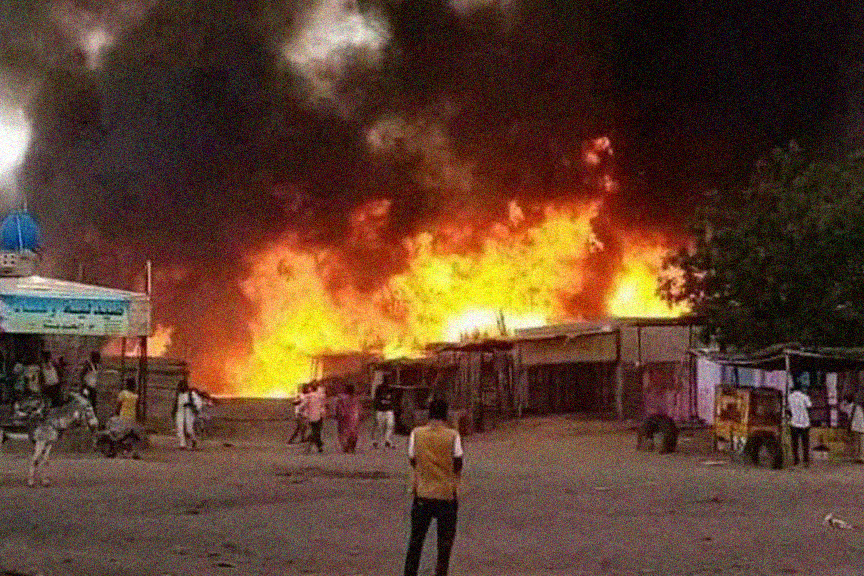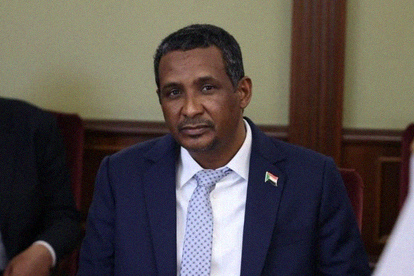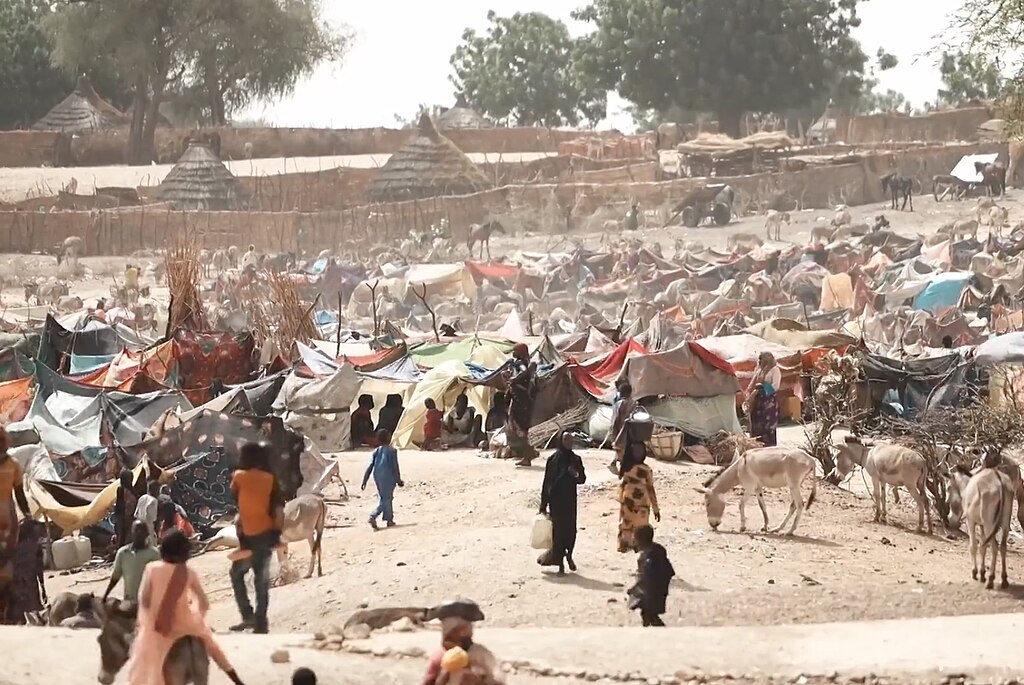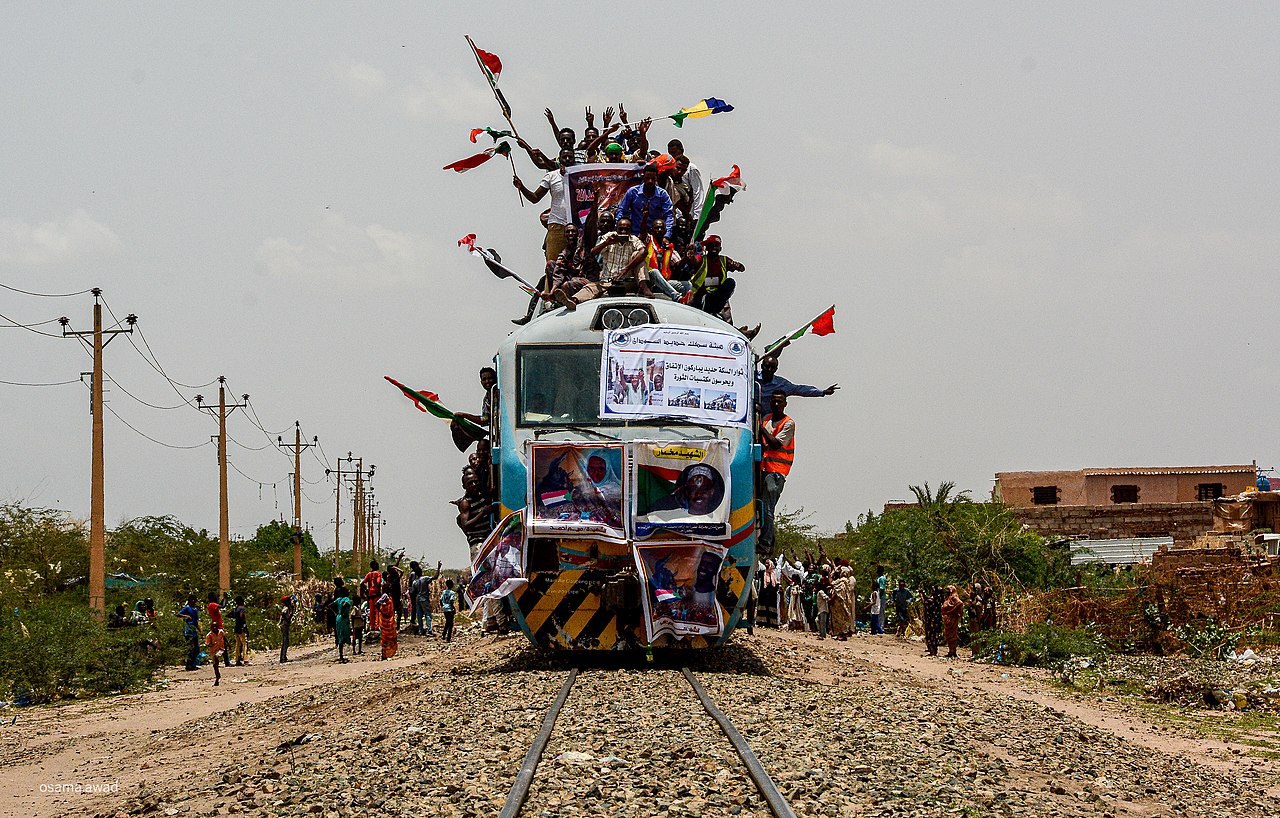
Sudan is bleeding to death. Since 2023, at least 150,000 people have been slaughtered and 12 million displaced by a civil war between two counter-revolutionary armies, both committing atrocities, and each backed by various foreign powers eager for their slice of this mineral-rich and strategically important African nation.
Sudan was previously ripped apart in 2011 following decades of bloody conflict. It now stands to be torn once more in a bitter struggle between the ‘official’ Sudanese Armed Forces (SAF) led by General Abdel Fattah al-Burhan; and the paramilitary Rapid Support Forces (RSF), under the command of Muhammad Hamdan Dagalo Musa, also known as Hemedti. These two cutthroats, who cooperated to drown the Sudanese Revolution in blood, are now battling each other for the spoils.
As we write these words, the Western Darfur region in particular faces the most unspeakable savagery imaginable. Gangs of militamen are murdering, raping and looting everywhere they go. The scale of the destruction is literally visible from space. Meanwhile, the SAF (presented in the western media as the more ‘respectable’ force) is indiscriminately bombing and deliberately starving civilian populations. How have we arrived at this nightmare?
Horror without end
The immediate cause of this catastrophe is the defeat of the Sudanese Revolution, which ran from 2018 to 2021. But the origins of that revolution and counter-revolution are themselves bound up with Sudan’s misfortune of being a resource-rich country, positioned between the Middle East and Sub-Saharan Africa, with access to both the Red Sea and the Nile. This has placed it at the heart of competing predatory capitalist interests.
Sudan was formerly a colony of Britain and Egypt, with the former employing its typical divide-and-rule policy to maintain control. British imperialism deliberately stoked tensions between Sudan’s 19 major tribal groups, 597 ethnic subgroups and more than 100 linguistic groups, and particularly leaned on the Muslim Arabs in the north of the country against the Christian and animist black Africans in its south.
For much of its history since winning formal independence in the 1950s, Sudan has been ruled by a clique of military leaders, who have exploited their positions to enrich themselves, and continued to use racist demagogy to divide the population. The SAF is intimately bound to Sudanese capitalism; it is the biggest shareholder in the central bank, owns massive amounts of property, and has its tentacles wrapped around various business interests that reap vast profits from Sudan’s abundant oil and gold reserves.
In the 2000s a crisis in the Darfur region saw non-Arab rebels rise against the government in Khartoum. The regime of General Omar Al-Bashir in Khartoum deployed the Janjaweed tribal militias on the side of the central government. These forces, made up of Arabised nomads under the command of Hemedti (himself from the Rezeigat nomadic group), were notorious for their brutality, unleashing genocidal terror against non-Arabs. These backward mercenaries were officially constituted as the Rapid Support Forces (RSF) by Al-Bashir in 2013.
In the years since, Hemedti benefited from his position at the head of this influential paramilitary to accrue great political and economic power. His strength amongst border tribal regions allowed him to fence Sudan’s immense gold reserves, an estimated 95 percent of which is exported illegally.
He was also granted control over the Jebel Amir gold mines in the west of the country in return for his bloody work in Darfur. He won even greater wealth and influence by offering up his forces to the United Arab Emirates for their war against the Houthis in Yemen after 2018.
When the Sudanese Revolution broke out in 2018, Hemedti played a leading role in the counter-revolution. He prepared the ground by cultivating support amongst the backward tribal and traditional leaders in the country, who feared (correctly) that the democratic aspirations of the revolution would threaten their positions.
Because there was a degree of sympathy from the rank-and-file of the regular armed forces towards the revolution, Hemedti’s RSF militiamen served as the sword of counter-revolution, massacring the revolutionary encampment outside of the military headquarters in Khartoum in 2019.
Hemedti is a ruthless killer. But he is also an ambitious politician who is not fully trusted by the main military clique who hired him as their attack dog. Having played a key role in the counter-revolution, and with an estimated 100,000 troops under arms, Hemedti felt sufficiently strong to make his move against his erstwhile ally Al-Burhan.
The civil war
In April 2023, the RSF launched a blitzkrieg in which it took over most of Khartoum, seized the airport, attacked military bases, and forced Al-Burhan to retreat to Port Sudan. Hemedti then embarked on a diplomatic tour around Africa, presenting himself as the new ruler of the country and trying to cultivate alliances. A ceasefire agreement negotiated by the USA and Saudi Arabia in Jeddah in May was soon broken, and pledges to protect civilians were repeatedly flouted, with both sides committing atrocities.
The SAF rallied after its initial losses, retaking the capital and much of the surrounding Khartoum state in March 2025. This ‘liberation’ was the definition of a pyrrhic victory. Government ministries, banks, office blocks and hospitals had all been gutted by air strikes and artillery fire. The scale of utter destruction is evident from satellite images that resemble the Gaza Strip following the IDF’s genocidal war.
The RSF has refocused its efforts on the Darfur region, which it now almost fully controls. This is despite the SAF launching heavy, indiscriminate airstrikes in Darfur throughout the war, which have killed huge numbers of civilians. In April 2025, the RSF brought various rebel and tribal groups under its control and declared a parallel regime (under the Orwellian title: the Government of Peace and Unity), which laid claim to the entire country.
On 26 October, El-Fasher, the largest city in western Sudan and the last stronghold of the SAF in the region, fell to RSF forces. Civilians trapped inside had suffered famine and daily bombardment during an 18-month siege, with fears that the RSF would unleash a bloodbath should the city fall. Already, Hemedti’s forces had ethnically cleansed the Masalit population of the Darfuri city of Geneina.

Sure enough, when the SAF finally withdrew from El-Fasher in a disorderly rout, the RSF subjected the 200,000 civilians trapped within its walls to an orgy of murder, rape and pillaging.
At least 36,000 have fled, with many thousands more unaccounted for. Dozens of videos are being posted on social media by RSF militiamen themselves, showing them gleefully murdering civilians, targeting non-Arabs. Those who managed to flee report their relatives shot in front of them and being ordered to bury the bodies with their bare hands. Many of the survivors are being held to ransom.
The nearby Zamzam displacement camp is overcrowded and starving, made worse by targeted attacks and looting by the RSF. Simultaneously, SAF-controlled officials in Port Sudan have delayed shipments to RSF-controlled areas, exacerbating famine in these regions. Despite this, Sudan’s agriculture minister Abubakr al-Bushra claimed there is “no famine at all”(!)
Next in Hemedti’s sights is El-Obeid, the oil-rich capital of North Kordofan state, where at least 137,000 people are sheltering. On 25 October, the RSF announced that it had retaken Bara, just 59 kilometres away, from which it launched artillery and aerial attacks on the city. The RSF is preparing another siege against El-Obeid, which is a strategic link between Darfur and Khartoum. If it is captured, the SAF will also lose the crucial buffer between Khartoum and RSF territory, and another massacre is inevitable.
In short, neither side is willing to accept an end to the conflict along its present lines, nor able to impose its own terms. On 6 November, the RSF agreed to a US-led ceasefire for three months to allow humanitarian aid, but the SAF refused. The RSF then launched a drone attack on Khartoum a day later. The Sudanese masses are trapped in a deadly attritional war between two sets of murderous gangsters. Even when it ends, they are guaranteed dictatorial military rule.
The UN reports that a fifth of the country’s population has been forced from their homes, and half – about 21 million people – are suffering life-threatening food insecurity. Sudan is now facing its third civil war and second genocide since independence. The situation is the very epitome of horror without end.
Predatory powers
The disaster unfolding within Sudan is being stoked by various foreign powers. Hemedti’s most important ally is the UAE, with whom he has had a close working relationship since sending RSF troops to support the war in Yemen.
The UAE has been steadily increasing its influence in Africa over the last period. It is Africa’s fourth biggest investor by FDI, behind the USA, China and the European Union, and the continent’s number one investor in terms of the number of new business projects. Further, the UAE is by far the main buyer for African gold, including gold exported illegally from mines owned by reactionary militias like the RSF.
The UAE is suspected to be the RSF’s main weapons supplier via covert transfers routed through Chad, Libya and South Sudan. UAE-manufactured drones have helped the RSF counter the SAF’s air superiority and threaten previously secure strongholds like Port Sudan.
On the other hand, the SAF’s main backer is the military dictatorship of Abdel Fattah el-Sisi in Egypt, which shares an important trade route with Sudan via the Nile. China has kept a relatively hands-off approach, generally supporting the central government but trying to position itself as a mediator. Sudan is an important part of China’s Belt and Road Initiative, and owes about $2.5 billion to Chinese banks, which is supposed to be repaid with oil shipments. Hence Beijing’s desire for a return to ‘stability’.
The Saudis have also backed Al-Burhan, as have Turkey and Iran, which supplied drones to the SAF. Russia previously sent its Wagner paramilitary to train with the RSF in exchange for gold to help finance the Ukraine War. But Putin switched tactics in 2024, striking a deal with Al-Burhan to build a naval base off Sudan’s Red Sea coast. This will preserve a Russian foothold in the region following the fall of the Assad regime in Syria.
Al-Burhan’s central government tacitly has the support of US imperialism and the so-called ‘international community’, as the representative of ‘order’ and ‘continuity’ in the country. The western press is only now seriously beginning to take notice of the horrors in Sudan, mostly focusing on the crimes of the RSF.

Firstly, we should be clear that Al-Burhan is also committing war crimes, and was until recently in cahoots with Hemedti. And secondly, the western so-called democracies have their bloody fingerprints all over this war.
US imperialism actively backed the secession of South Sudan in 2011 in order to capture the country’s oil reserves and cut across the growing influence of China in the region. The outcome was a bloody civil war inside the new state, and economic crisis on both sides of the border. The US and Britain also collaborated in the war against the Houthis in Yemen, which provided billions of dollars to the RSF.
Moreover, one of the ways Hemedti was able to build his strength was via the European Union’s ‘Khartoum Process’, in which his RSF was literally bankrolled and trained for a decade to serve as border guards, keeping desperate refugees from fleeing to Europe via Libya. This initiative only ended in 2023 at the outset of the civil war. Even amidst the bloody crushing of the Sudanese Revolution, the EU continued to maintain its support for the RSF.
The criminal role of Sudan’s old colonial master, British imperialism, deserves special mention. Britain is the so-called penholder for Sudan, meaning it is delegated diplomatic responsibility for the country by the UN. But rather than using this position to advance Sudan’s interests, British imperialism has ruthlessly pursued its own interests over the corpses of countless civilians.
Up until now, the only time the British bourgeois press mentioned Sudan was to cynically attack the supposed ‘double standards’ of the Palestine solidarity movement. For example, an article in the right-wing Telegraph by Lara Brown, titled ‘Why is the Intifada crowd silent on Sudan?’ states that the country “may be witnessing a true genocide”. However, she notes: “When I walk down Whitehall, there is almost nothing about Sudan. The pavements outside No. 10 are still dominated by Palestinian activists and keffiyeh-wearing students.”
She goes on to say:
“Activists have spent two years marching on the street every Saturday complaining of an alleged genocide in Gaza. And yet a civil war has been raging in Sudan for decades and nobody seems to care […] Progressives also like to fashion foreign wars into proxy battles about British politics.”
Firstly, it is not ‘progressives’ but the British imperialists who have been ignoring the disaster unfolding in Sudan. As revealed by the Guardian, Britain had intelligence that genocide was impending in El-Fasher six months into the siege, but opted for the “least ambitious” plan to protect Sudanese civilians.
In reality, Britain took no real measures at all. This led Shayna Lewis, a Sudan specialist with the US-based human rights organisation Paema (Preventing and Ending Mass Atrocities), to describe the UK government as “complicit in the ongoing genocide of the people of Darfur.”
Secondly, the genocides in Gaza and Sudan have everything to do with British politics, because the British government is arming them both. It is no secret that Britain sends arms and components to Israel’s war machine. But as revealed by investigative reporting, Britain is selling arms to the UAE with the full knowledge that these are ending up in the hands of the RSF on the killing fields of Sudan, in defiance of international law.
According to documents seen by the UN Security Council, British-made small-arms target devices and engines for armoured people carriers were recovered from the conflict zone in Khartoum and its twin city of Omdurman. Britain has also conducted secret negotiations with the RSF, and has reportedly put pressure on diplomats from allied African nations not to openly criticise the Emirates in the course of ceasefire negotiations.
Much as Israel is an important geopolitical ally in the Middle East that the imperialists will not abandon, no matter how terrible its crimes, Britain has important trade and strategic interests bound up in the UAE. In 2013, Conservative then-Prime Minister David Cameron set up a secretive Whitehall unit specifically to court investment from the oil-rich sheikhs. This policy is dutifully continued by Keir Starmer’s Labour Party.
The lives of the Sudanese people are a small price to pay for protecting Britain’s capitalist interests. Thus, when any Israel apologist in Britain, or anywhere else, dares to exploit the tragedy of Sudan to deflect from the IDF’s crimes, we must expose their obscene cynicism. We say to these ghouls: keep the Sudanese people out of your lying mouths!
US imperialism has also been turning a blind eye to the UAE’s role in fuelling the conflict, because it relies on the Emiratis as a counterbalance to Chinese influence in the region. Both Britain and the US are essentially playing both sides.
The UN remains bankrupt as ever. The International Court of Justice has declined to rule on whether the RSF is committing a genocide, as Sudan does not fall under its jurisdiction. Even a token legal gesture is thus beyond the means of the highest body of international law.
Sudan: revolution to counter-revolution
Prior to the war, Sudan was already one of the poorest countries in the world, despite its immense natural resources. In 2022, 46 million of its people were living on an average annual income of $750 (£600).
This conflict has made things much worse. Last year, Sudan’s finance minister said state revenues had shrunk by 80 percent. The economy as a whole has collapsed by 40 percent. This economic hardship can be added to the terrible human toll of war.
The suffering of the Sudanese people today is commensurate with the strength of their revolution. More than once, power was within their grasp. Their general strikes in 2019 saw near-total observance in the capital and brought the country to a standstill. Through their neighbourhood resistance committees, they developed the embryo of workers’ power. All it would have taken is for the revolution to declare itself the new government and arrest the generals, organising fraternisation between the revolution and the lower ranks of the armed forces to equip the masses for a final showdown.

But as Trotsky warned at the outset of the Spanish Revolution, even the most promising conditions for victory can be thwarted by bad leadership. The Sudanese masses were not led by a Bolshevik Party with a perspective of seizing power and building socialism, but by a hodgepodge of liberals, pacifists and nationalists, many of them under the influence of western NGOs, who restricted themselves to ‘negotiation’ with the generals for a democratic transition. The generals simply bided their time, waiting for the opportunity to counterattack.
The Sudanese masses were left defenceless before the merciless forces of reaction. In trying to avoid a civil war between the forces of revolution and the counter-revolution, the liberal leadership facilitated a civil war within the counter-revolution, while the revolution was liquidated, along with all the organisations of the workers and youth. This has damned Sudan to a period of barbarism. How long it will last, we cannot say. Any revival of the revolution today will almost certainly depend on impetus from outside of the country, with the Egyptian working class (as the most advanced in the region) being especially key.
Despite the present conditions of black reaction, the Sudanese masses’ heroic struggle shows the immense revolutionary potential that exists all over the world. We are seeing evidence of this potential again in the wave of insurrection sweeping Asia and Africa as we write these lines. To this new generation of class fighters, Sudan stands as a stark warning: a revolution cannot be taken halfway.
The liberals thrown to the head of the Sudanese Revolution revealed their utter impotence to win democratic rule and betrayed the masses. The only force, then as now, capable of winning democracy and a dignified existence for the Sudanese people were the workers, youth and poor organised in the resistance committees.
All that was lacking in 2018-2021 was a party with the ear of the masses, willing to carry the revolution to its conclusion. This would have been a tremendous inspiration to the masses throughout Africa and the Middle East, becoming the spark of a wider revolutionary movement to eradicate capitalism from the entire region.
To quote Trotsky once more, the conditions for victory of any future revolution are three: a party; once more a party; again a party!

